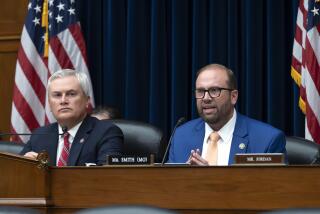GOP Committee Targets International Red Cross
- Share via
WASHINGTON — Senate Republicans are calling on the Bush administration to reassess U.S. financial support for the International Committee of the Red Cross, charging that the group is using American funds to lobby against U.S. interests.
The Senate Republican Policy Committee, which advances the views of the GOP Senate majority, said in a report that the international humanitarian organization had “lost its way” and veered from the impartiality on which its reputation was based. The Republican policy group titled its report: “Are American Interests Being Disserved by the International Committee of the Red Cross?”
The congressional criticism follows reports by the Swiss-based group that have faulted U.S. treatment of detainees in Iraq, Afghanistan and Guantanamo Bay, Cuba. A spokeswoman at its Geneva headquarters said the organization was reviewing the report and would not comment, in accordance with its policy of keeping its dealings with governments confidential.
Two Bush administration officials declined in interviews to endorse the findings of the report but said the administration had had “concerns” about some positions taken by the ICRC since the U.S.-led invasions of Afghanistan in 2001 and Iraq in 2003. The officials spoke on condition of anonymity because of diplomatic protocol and their relations with Congress.
“We need the ICRC. They do a lot of really good things,” one of the U.S. officials said. “They’ve got people in conflict zones all over the world doing heroic things on a daily basis. Are we concerned about some of the comments? Yes. Do we deal with those in our confidential relationship? Yes. But we think the relationship works best when these things are kept confidential.”
The Senate Republicans’ report called on the Bush administration to ask the Government Accountability Office to review Red Cross operations, noting that the U.S. funds 28% of the group’s budget and has contributed $1.5 billion since 1990. The International Committee of the Red Cross is separate from the American Red Cross, which has no say in how the international committee is run.
But the official said the administration had “a great deal of confidence” in the group’s financial propriety.
“They’ve got Swiss auditors all over the place, as only the Swiss can do,” the official said.
The second official said the administration had had differences with the ICRC over treatment of detainees and some other military issues, but that “we generally are able to work through them.”
Asked whether Congress should get involved, the official said, “The relationship has worked well without the involvement, and perhaps it should continue that way.”
The Senate Republican Policy Committee, which is chaired by Sen. Jon Kyl of Arizona, has close ties to the Bush administration. It meets weekly to coordinate policy and often distributes “talking points” for Republican senators that are coordinated with the White House. It bills its role as helping to “shape the GOP game plan.”
The decision to investigate the ICRC was sparked by a series of articles in the conservative National Interest magazine as well as by critical Wall Street Journal editorials, a senior aide to the policy committee said.
According to the GOP report, the National Interest articles found that the ICRC made “no discernible effort” to improve the lot of American prisoners of war in Korea, Vietnam and Iraq, and “conspicuously failed to criticize” those governments for torture, killings and abuse of U.S. prisoners.
The ICRC is the only organization mandated by international treaty to monitor the observance of the Geneva Convention governing the treatment of prisoners, and it has the right to visit prisoners. But the GOP report charges that the group has exceeded the bounds of its mission by trying to “reinterpret and expand international law” in favor of terrorists and insurgents; lobbying for arms-control issues that are not within its mandate, such as a ban on the use of land mines; and “inaccurately and unfairly” accusing U.S. officials of not adhering to the Geneva Convention.
The Senate aide denied that the report, released Monday, was motivated by a desire to punish the ICRC for embarrassing the United States on its treatment of prisoners. In the aftermath of the prison abuse scandal at Abu Ghraib in Iraq and elsewhere, the role of the ICRC has grown in importance, some experts said.
“For U.S. military commanders, the ICRC is crucial as their feedback loop,” said Ruth Wedgwood, a specialist in international law at Johns Hopkins University’s School of Advanced International Studies. “That’s how a commander knows what’s happening down in their ranks -- even on the night shift. We really do need that function. That’s why we pay them a lot of money -- not just to assist on tsunamis.”
More to Read
Sign up for Essential California
The most important California stories and recommendations in your inbox every morning.
You may occasionally receive promotional content from the Los Angeles Times.













